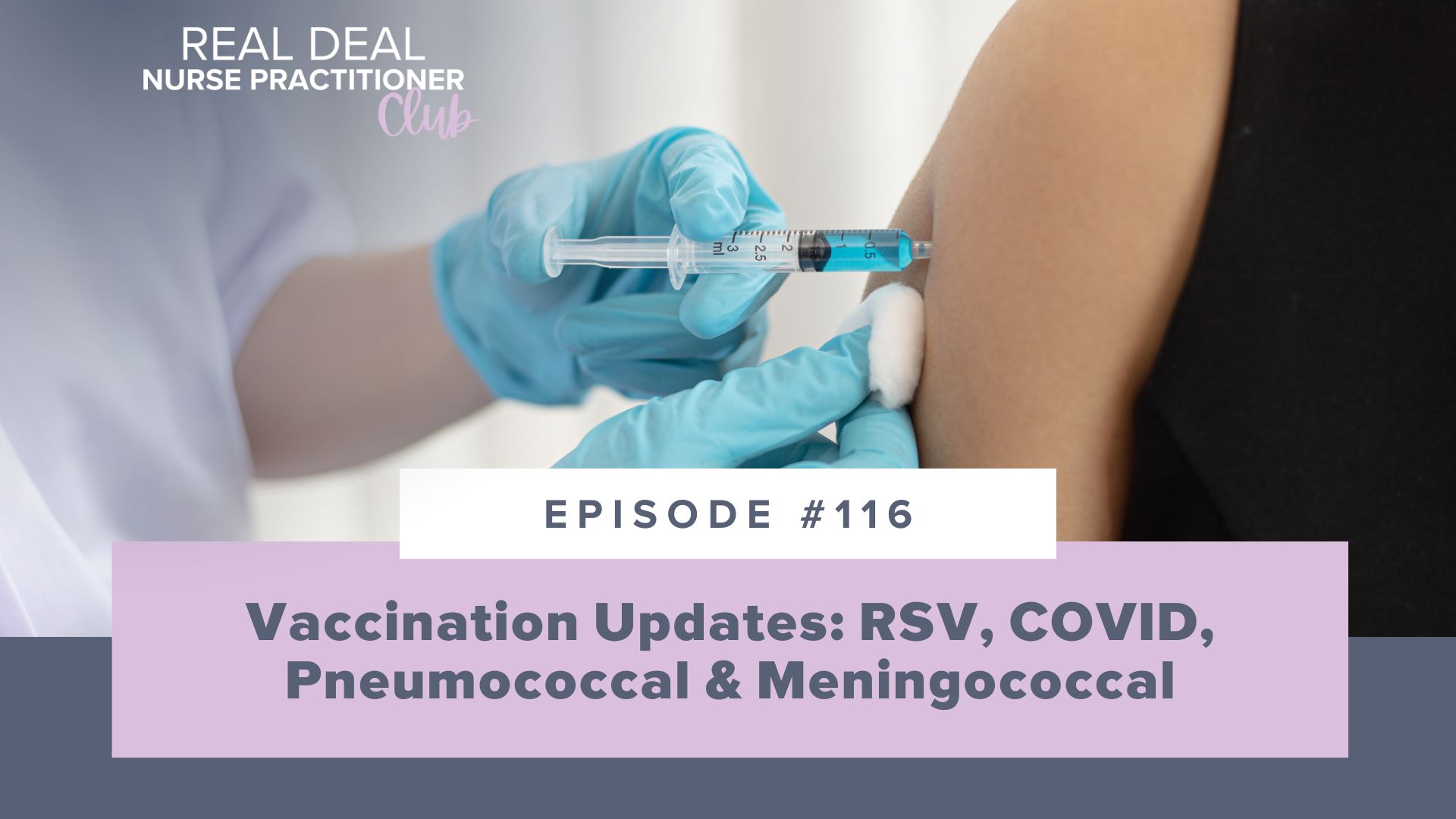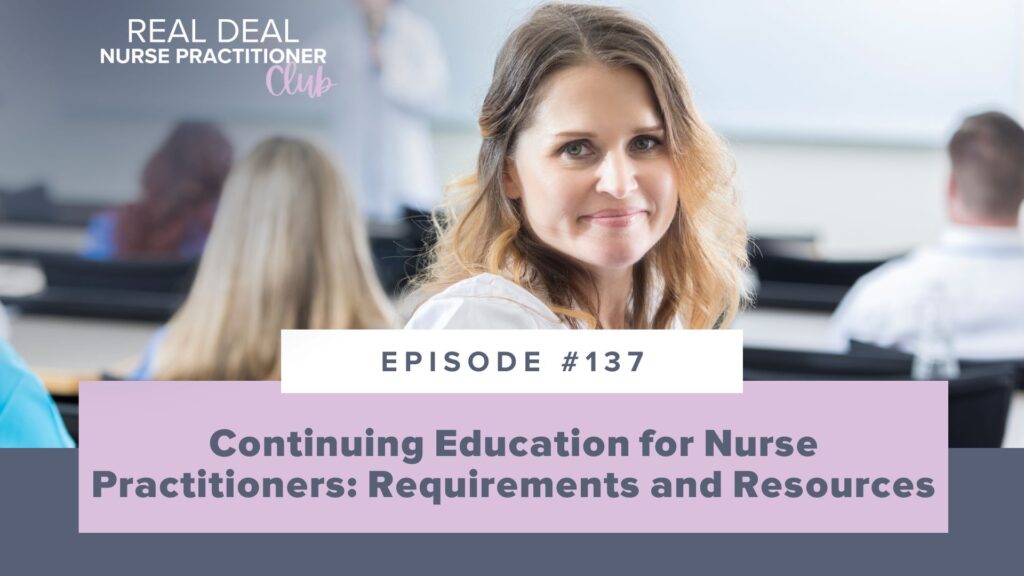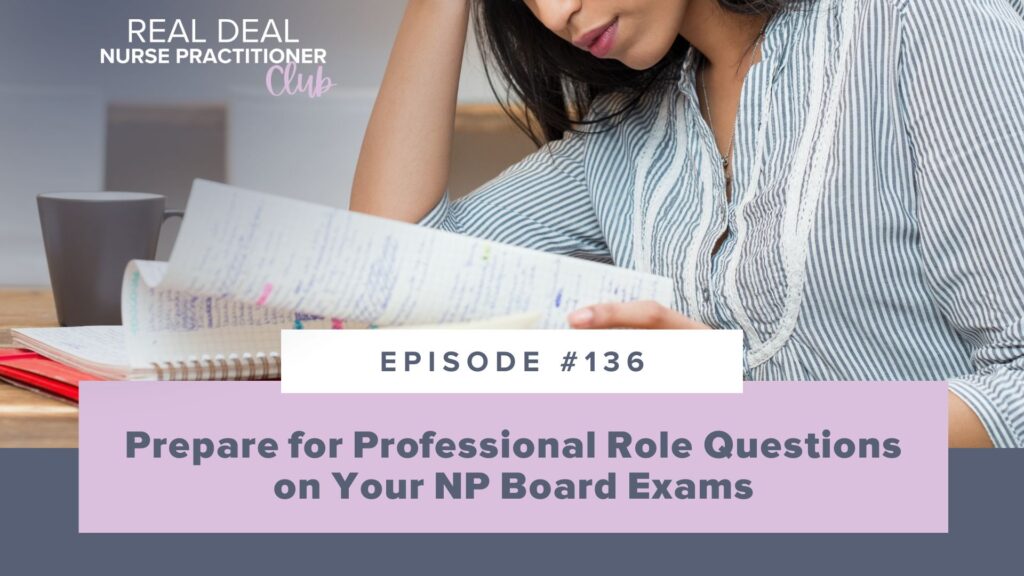Ep #116: Vaccination Updates: RSV, COVID, Pneumococcal & Meningococcal
- by Sarah Michelle
- Jun 26, 2024
- Podcasts

What You Will Discover:
- Important updates to RSV, COVID, pneumococcal, and meningococcal vaccinations.
- The differences between RSVPreF3 and RSVpreF.
- How mRNA vaccines work.
- The importance of up-to-date patient education in vaccination administration.
Featured on the Show
- Follow me on: Facebook | Instagram | YouTube | TikTok
- Follow us on TikTok and YouTube!
- Centers for Disease Control and Prevention
Full Episode Transcript:

Welcome to the Real Deal NP Club. Whether you’re hoping to become a real deal nurse practitioner or you already are one, this is the place for you to get the resources you need as you tackle this massive transition into practice. We’re your hosts, Sarah Michelle, Chief Nursing Officer of Blueprint Test Prep, and Anna Miller, Director of Nursing Content. And we’re here to hang out with you each week like your best friends in the NP space. Let’s dive in.
Sarah: Hey y’all, there have been quite a few updates with vaccinations over the past several years and so we wanted to take the time with you today to review all of those. Depending on what population you care for, from pediatrics to older adults, you may be getting asked questions on these vaccinations. And the four vaccinations that we are going to cover today are those for RSV, Covid, pneumococcal, meningococcal conditions. And of course, I have Anna here with me to help give some guidance as well.
Anna: Yes, hello. We’ve got a ton of information to share with you. And now I do want to give the little caveat that this is going to be a little more in depth than what you need to know for your board exam, and that is what our courses go over. But these are going to be really, really pertinent things that you’re going to see either in your clinical rotations or you may be asked about, and you’ll definitely see in practice as well.
And with each of those vaccination types, we’ll just go over the indication, administration schedule, and the important guidance and patient education that you need to know as a real deal NP.
And of course, things always, always update. So when you’re in practice, make sure you are looking up the most up-to-date information in case anything has changed.
Sarah: Yes, always. So first up, I’m super excited to talk about this one. In the fall of 2023, RSV vaccines were approved for administration during pregnancy to infants entering into their first RSV season, which we know can be a really scary time, and to older adults. Up to 80,000 infants and young children are hospitalized each year from RSV and the complications that arise from it.
And the other vulnerable population that we have to think about with RSV in particular is our older adults. And up to 10,000 older adults die each year from an RSV infection. And so the fact that there are now vaccinations available is a really, really huge deal.
Anna: Yes, this is huge. I was so excited when I heard about these vaccines. And I know my baby, when she was four months old, got hospitalized for days and days with RSV. So this is huge.
But let’s start with the options for older adults. There are actually two vaccines. There’s the RSVpreF3 and the RSVpreF. Now, both vaccines provide good protection against lower respiratory infections from RSV, and really neither one is considered better than the other. The main difference between them is that the RSVpreF is a bivalent vaccine for RSV types A and B, but the RSVpreF3 still shows good coverage against both types, despite not being a bivalent vaccine.
Now, Sarah, can you go over how long older adult patients can be protected after one vaccination?
Sarah: That’s a little bit of a difficult question because long-term studies are still ongoing. But so far, there is evidence that with RSVpreF3, that immune protection lasts into at least two RSV seasons. And just to recap, RSV season in the United States is typically October through April. And so right now, the current recommendation for older adults over the age of 60 is a one-time vaccination with either of those.
Now, to talk about our other really vulnerable population for RSV here, infants and young children. The RSVpreF is approved for use in pregnant patients who are between 32 to 36 weeks gestation and would be having an infant that would be born during the RSV season.
Those infants can be born with RSV protection, which is really, really cool. Anna, now what about infants during RSV season who do not have the passive immunity? So there’s the RSV immunization, which is actually an antibody product, it’s not a vaccine, and it’s known as Beyfortus.
And since it’s not an antibody product, it provides passive immunity. And it has a shorter duration than typical vaccines, right, that cause active immunity. Now, this can be given as a one-time injection to newborns and infants in that first year who are entering that RSV season. And it can also, interestingly enough, be administered to toddlers entering their second RSV season who may still be vulnerable to an RSV infection.
And there are two different doses based on weight, like usual for pediatrics. So for less than five kilograms or for over five kilograms.
Sarah: And of course, we have to talk about price here. And the downside of these vaccines is going to be their costs. Since they’re new, they’re quite expensive. And insurance coverage is really going to vary. And so while they hold a lot of promise to improve outcomes in RSV infections and prevention, have patients double check with their insurance company so that they understand any potential out-of-pocket costs.
I know with my insurance in particular, it would get approved literally about 24 hours before she was about to receive the dose. And then her pediatrician would call us to verify that we were going to come in at the time that we said that we were, because they would FedEx in the dose. Like it was that intense making sure that she got her dose and making sure we got the dose covered.
Anna: Wow.
Sarah: I know, it’s kind of wild. I was like, what do you mean we’re waiting on the FedEx van? Like, I don’t understand.
But to move on to another virus with significant effects on morbidity and mortality, we’ve of course got to talk about Covid. There aren’t too many changes with the Covid vaccines, and so we’ll just do a quick recap here.
For Covid vaccinations, we have two different types available right now. We have the mRNA vaccines by Pfizer-BioNTech and Moderna and that protein subunit vaccine by Novavax. So Anna, can you just kind of give us a quick run through of how those mRNA vaccines actually work?
Anna: Yeah, so like very briefly, right? MRNA itself stands for messenger RNA and that carries genetic code information so that the ribosomes can essentially read it and then they create specific proteins. So with mRNA vaccines, cells are taught how to make proteins that can trigger that immune response and antibody formation. So they do not contain any part of the virus and like cannot cause illness themselves.
Sarah: Yes, make sure you hear that part. They do not contain any part of the virus. And like Anna said, they cannot cause illness themselves. I know that’s a little bit of patient education that we sometimes need to provide with these too.
And as we mentioned, there are two kinds of approved mRNA vaccines by Pfizer-BioNTech and Moderna, both of which can be given to individuals who are six months of age or older. Similar to the flu vaccine, they’re going to be updated to really provide protection against whatever the most current strain is. And because of this, these Covid vaccines are frequently updated. Booster vaccines can be given as often as every six months.
Anna: Yeah, and the newer Covid vaccine that’s now available is by Novavax. This one is a more traditional protein-based vaccine, which can be a really good selling point for individuals who might be hesitant to use mRNA technology. The Novavax option has similar efficacy against preventing Covid infections as the mRNA options. But the one thing is that the age of vaccination for this option is for 12 years and older.
Sarah: And then moving on to our next one, there have actually been some pretty great advances in pneumococcal vaccines as well. So just in the last few years alone, we have had the approval of Vaxnuvance, a 15-valent vaccine, and Prevnar 20. And both of these offer more protection than that previous Prevnar 13.
Anna: Yeah, and as you may be able to guess, that Vaxnuvance and Prevnar 20 protect against 15 and 20 strains, respectively, of pneumococcal pneumonia. And so either vaccine can replace Prevnar 13 in routine childhood vaccinations. And then what is that vaccination recommendation for adults?
Sarah: This is where you have to memorize just a little bit, unfortunately. So in older adults, meaning 65 years of age and older, we can administer either the Vaxnuvance or Prevnar 20, or we have the option for Pneumovax 23.
Now, Pneumovax 23 is a polysaccharide vaccination where the other options are conjugate vaccines. And the big difference here, because I know I’m throwing some really big words at you right now, is that the conjugate vaccines last longer and they’re more effective. But Pneumovax protects against 23 strains, which is more than the conjugate options offer.
And so in adults over 65, if they are given the 15-valent polysaccharide, they should have a dose of that Pneumovax 23 one year later. And if they receive Prevnar 20, no further follow-up is needed.
Anna: Yes, and remember, don’t stress, I know this is a lot right now. This is all stuff that you can go back and you can reread or re-listen to and look up over and over until you have this down. And the availability of the conjugate options really varies, so keep that in mind too. The Vaxnuvance and Prevnar 20 are made by different manufacturers and they have slightly different costs, so it is clinic dependent on which option they carry. So you just have to learn about what option your clinic that you work in has.
But really the big thing to remember here is that if they receive the 15-valent option, they should follow up with Pneumovax 23 a year later.
Sarah: Yes, that is the core piece of information to remember about these pneumococcal vaccines.
And then the last thing that we’re gonna wrap up here with is the meningococcal vaccines. Meningococcal vaccines are typically given to adolescents because they’re at the most risk for this infection. Now there’s five different strains. We’ve got A, B, C, W, Y, and a quadrivalent or a four-strain vaccine is available as Menveo or MenQuadfi. And it protects against types A, C, W, and Y. And this is given to adolescents around age 11 and then again around 16.
Anna, what is the other vaccine?
Sarah: So you mentioned, right, A, C, W, and Y strains. The other meningococcal vaccine is for strain type B and is under the name Trumenba or Bexsero, which you’ve probably heard of. So Trumenba is a two or three-dose series depending on risk factors and Bexsero is a two-dose series. And these meningitis B vaccines are typically given to adolescents and young adults between 16 to 23 years old.
And really the big update here is that there is now a pentavalent vaccine that protects literally against all five strains. So that’s really big, A, B, C, W, and Y. And this can be used to replace separate immunizations for those getting that vaccine that covered just the four and the MenB vaccines at the same visit. And so that pentavalent vaccine is listed under the name Pembraya.
Sarah: All right, y’all. We have talked about the major vaccine updates affecting our patients, and there’s just really a lot of great things on the horizon too for RSV protection, which I’m super excited about, and new options for Covid, pneumococcal, meningococcal, and all the ways that we can prevent these diseases.
Anna: Yeah, and I know we mentioned a whole lot of different vaccine names and a whole bunch –
Sarah: So many names.
Anna: So many names, so many strains, so many different types of vaccine technology. It’s really, really cool just the amount of things that are out there and how things keep changing and improving for our patients. So definitely feel free to listen to this episode again, take notes, right?
I always, always recommend, of course, look up our great resource, the CDC, and you can find the full vaccination information and recommendations on their website.
Sarah: Yes, the big thing here was just getting some of those snippets. Like we have something new for RSV. There is a new pentavalent vaccine for meningococcal, for example. Like take away the big takeaways and that will be what sticks with you in practice. But thank you for tuning in. Thanks for hanging around with all the big words that we were throwing around, and we hope that you enjoyed this topic and we’ll talk to you soon.
As an extra bonus friends, if you’re looking for support no matter what phase of your nurse practitioner journey that you’re currently in, I have communities available for both students and new nurse practitioners. In these communities, we work to uplift one another and grow this profession together every single day. Links to join will be included for you in the show notes.
Thanks for listening to the Real Deal Nurse Practitioner Club. If you want more information about the different types of support that we offer to students and new nurse practitioners, you can visit npreviews, with an S, dot com. We’ll see you next week.
Enjoy the Show?
- Don’t miss an episode: follow the podcast on Spotify, Apple Podcasts or RSS.
Related Posts
Search the Blog
Prepping for Primary Care NP Boards?
Join our Primary Care Live Study Group or check out the Self-Paced Courses & Qbank options!
Learn MoreExplore Specialty NP Qbanks & Mock Exams
Practice with board-style questions for your AGACNP, PMHNP, ENP, WHNP, or PNP exams.
Get StartedJoin our Facebook Group!
Get FREE support and encouragement from thousands of FNP/AGPCNP students and our NP support team.
Join the CommunitySign Up for Free Live Classes
Join us for FREE monthly live study sessions covering topics such as antibiotics, diabetes, musculoskeletal conditions, depression & anxiety, and more!
Grab a Spot


